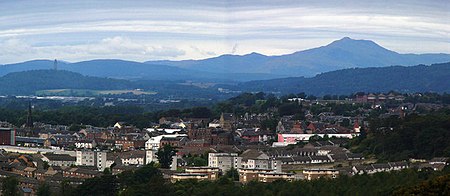Alloa

Alloa (Received Pronunciation ; Scottish pronunciation /ˈaloʊa/; Scottish Gaelic: Alamhagh, possibly meaning "rock plain") is a town in Clackmannanshire in the Central Lowlands of Scotland. It is on the north bank of the Forth at the spot where some say it ceases to be the River Forth and becomes the Firth of Forth. Alloa is south of the Ochil Hills, 5.5 miles (8.9 km) east of Stirling and 7.9 miles (12.7 km) north of Falkirk; by water Alloa is 25 miles (40 km) from Granton.The town, formerly a burgh of barony, is the administrative centre of Clackmannanshire Council. Historically, the economy relied heavily on trade between Glasgow and mainland Europe through its port. This became increasingly uncompetitive and the port stopped operating in 1970. The local economy is now centred on retail and leisure since the closure of major industries; only one brewer and one glassmaker survive today. Parochially, Alloa was linked with Tullibody. The towns are now distinct, albeit with Lornshill in the middle, and Alloa is about twice the size of its north-western neighbour. The population of Alloa was estimated to be approximately 20,730 residents in 2016.
Excerpt from the Wikipedia article Alloa (License: CC BY-SA 3.0, Authors, Images).Alloa
Drysdale Street,
Geographical coordinates (GPS) Address Nearby Places Show on map
Geographical coordinates (GPS)
| Latitude | Longitude |
|---|---|
| N 56.116 ° | E -3.793 ° |
Address
Crown Office & Procurator Fiscal Service (Alloa Procurator Fiscals Office)
Drysdale Street 47
FK10 1JA
Scotland, United Kingdom
Open on Google Maps







